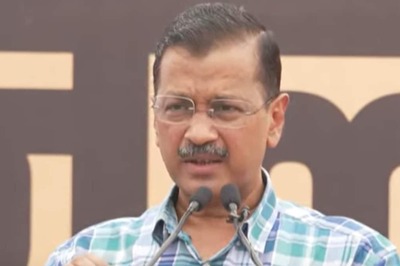
views
Close to four lakh Muslims in Assam gave “missed calls” for primary membership of the BJP in the past three months, say party leaders, indicating a trend that could rank among the highest across all states in the country. They join another two lakh who had registered since 2015, constituting around 13 per cent of the total 47 lakh such calls the party has received from residents of the state so far. Missed calls are an extremely popular phenomenon in India when people, often with prearrangement, call a number and deliberately hang up to escape paying for a conversation. The Bharatiya Janata Party has evidently capitalised on it.
Among other factors, the apparent growing interest in BJP membership among Muslims of the state is the result of two outreach drives launched by the party, aimed at Assam residents. The first one in 2015 was followed by a more vigorous exercise that began last July, raising the overall figure from 27 lakh to 47 lakh, including Muslims.
“There was hardly any enrolment of Muslims in the BJP in Assam before 2015. Uttar Pradesh, Karnataka and Andhra Pradesh have registered highest membership among Muslims compared to other states in the country,” said Assam state BJP vice-president Vijay Gupta. “But the percentage is higher in Assam.”
Joining the BJP requires only a missed call which gives primary membership to the caller, but many have been found to back out from the subsequent step of filling up a form. There is also a follow-up process after the primary membership of the caller is registered. Usually, a BJP activist from the respective locality would approach the caller with a form which is filled up and submitted.
District-wise figures were not disclosed by the BJP but Gupta revealed that Muslims from the western districts of the state (lower Assam) have more applicants. Apparently Bengal-origin Muslims, including those who had settled in the post-1971 period, inhabit the districts in western Assam more than the eastern part of the state.
In the 2011 Census, Muslims were found to comprise 34.22 per cent of Assam’s population, which is around 10,680,000 of the state’s total 3.12 crore residents. They consist of the indigenous Assamese Muslims, Bengal-origin Muslims and the Hindi-speaking community from Bihar and Uttar Pradesh. It could be concluded that their numbers have gone up by at least a million now.
So, the six lakh who have applied for primary membership of the party constitute only about five per cent of the total Muslim population in Assam. But it indicates new political options being explored by the Muslims of Bengal-origin in certain areas of Assam.
The opinion of some BJP workers that the “rush” to join the party by a section of the Muslims in Assam is a “natural development” and the outcome of Prime Minister Narendra Modi’s slogan of “sabka saath, sabka vikas” is not accepted by academics and activists engaged with other organisations in the state.
Former chairman of Joint State Haj Committee of Northeast, Hamim Kutub Javed Ahmed, said, “BJP’s popularity is noticed primarily among sections of Bengal-origin Muslims in Barpeta, Dhubri, Goalpara and Nagaon. BJP is in power at the Centre and the state, and they think that joining the party will give them a shield of protection. They already have their names enrolled in the NRC and they are no longer afraid of being victimised.”
More than 19 lakh people have been left out of the final version of the National Register of Citizens in Assam, aimed at identifying infiltrators, which was published in August. Some activists and the BJP’s rivals had alleged that the exercise was prejudiced against Muslims.
Except the Assamese Muslims who have been known to cast their lot with the Asom Gana Parishad (AGP) often, other Muslim communities in the state have usually preferred the Congress, and the All India United Democratic Front (AIUDF) in some pockets since the past few years. But there have been occasions when the Bengal- origin Muslims opted for other parties in Assam. For instance, large numbers from this community voted for the AGP in 1996 since there was an anti-incumbency wave and it was almost certain that the Congress would lose the assembly polls.
But the Congress has been fast losing ground in Assam, similar to its situation in many other states. “The political space has been taken up by the BJP in Assam. The AGP has been on the back foot and so it’s not surprising that a section of the Muslims in Assam have begun to prefer the BJP,” said Prof Munirul Hussain, who is associated with the Centre for Policy Research and North East Studies in Jamia Millia Islamia university.
Among the four assembly seats in Assam where bypolls are to be held on October 21, Jania is the only constituency where a majority of the voters are Muslims of Bengal-origin. Located about 100 kilometres west of Guwahati, it was last won by Abdul Khaleque of the Congress who later vacated the seat to contest and win from the Barpeta Lok Sabha constituency. While the BJP appears to have an edge in the remaining three seats, its performance remains uncertain in Jania where it has fielded an Assamese Muslim, Tawfiqur Rahman, as the candidate.
Jania’s election results since the first assembly polls in 1952 reveal an interesting profile. While the Congress has won seven times, other parties such as the United Minorities Front of Assam, AIUDF and independent candidates have also registered victories on occasions in the last seven decades. This is also the constituency which elected Fakhruddin Ali Ahmed of the Congress three consecutive times, before he became the President.
Some locals from the constituency and observers in Barpeta are of the firm opinion that the pattern of the previous three assembly polls would be repeated when the contest was between the Congress and the AIUDF. They explained that the competition would be “extremely stiff” since the AIUDF is a strong contender and the BJP is also likely to increase its vote share despite the fact that party workers are unhappy over the decision by the high command to field a non-local candidate.
(The author is a senior journalist based in Guwahati)




















Comments
0 comment